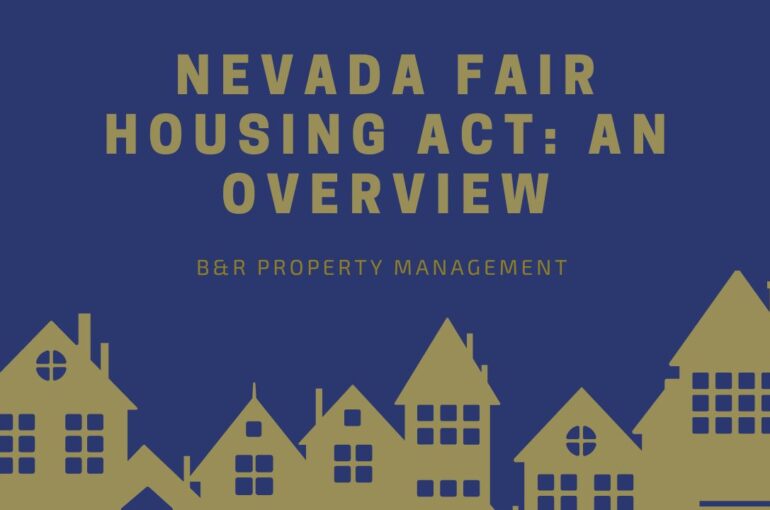Nevada Fair Housing Act: An Overview
Nevada Fair Housing Act: An Overview

All home seekers in Nevada must be given equal opportunity to look for a place to live without fear of being rejected because of factors they cannot control.
The Nevada Fair Housing Act was created to protect tenants and guide landlords in Nevada on the correct housing practices. This regulation aims to use the renter’s financial history as a qualifier instead of their personal characteristics or background, affirmatively furthering fair housing.
As a landlord in Nevada, you have to be well-versed with the fair housing laws to prevent issues of housing discrimination. It’s easy to unknowingly violate the state Fair Housing Laws because housing discrimination is still possible no matter how well-intended your behavior is.
The following is an overview of Nevada’s Fair Housing Laws:
The Seven Protected Classes
Federal fair housing laws aim to prevent housing discrimination against people based on these seven categories:
- Race
- Color
- National origin
- Religion
- Disability
- Sex
- Familial status (includes having children and/or being pregnant)
Nevada’s Fair Housing Laws protects these seven classes from housing discrimination. Being a landlord, you have to be consistent with your terms and conditions when managing applicants and tenants. Avoid disputes by being knowledgeable about the behaviors that could be discriminatory under this act.
Remember to properly assess applicants or tenants on whether or not they can uphold their responsibilities rather than on their protected classes. Upholding their responsibilities includes respecting other tenants and your property.

Here are some examples of fair housing violations for each of the seven protected classes:
Race
You can’t refuse to rent to a prospective tenant because of their race. Additionally, landlords should not publish discriminatory advertisements regarding race.
Color
Withholding some information about the rental because of an applicant’s color is a violation of fair housing laws. To be compliant with the law and prevent discrimination, you must provide all pieces of information to any applicants so as not to mislead anyone.
National Origin
As a Nevada landlord, you must not include biases in published ads, such as providing promotional discounts to preferred nationalities. Be fair to all interested renters by making the discount available regardless of their national origin or any other protected characteristic.
Religion
Since the federal fair housing act prohibits discrimination, it’s considered discriminatory to evict a tenant because they practice a certain religion. You must treat all tenants equally regardless of the religion they belong to.
Disability
It’s discriminatory in nature if you fail to make reasonable accommodations and rental modifications for tenants with a disability as per as the federal fair housing act. For instance, if you have a no-pet policy, this cannot apply to tenants with a disability or someone with a service animal.
Sex
Outside of shared spaces or dormitories, it’s considered discriminatory to select a tenant based on their sex or gender identity as per as fair housing laws. Fair housing laws also prohibits discrimination based on one’s sexual orientate. Rejecting applicants must be backed by financial data and should not be based on one’s sex, gender identity, expression, or sexual orientation.

Familial Status
Since fair housing law prohibits discrimination, landlords must not reject a applicants because of their familial status. Asking to pay for a higher rent or deposit because the tenants have children under 18 years of age is also considered a violation of fair housing regulations.
Showing a family the ground floor or the back units only is also a violation of this act. Restricting families to certain units over others available ones is a violation of the state and federal Fair Housing Laws.
The Exemptions From the Fair Housing Laws
While the seven categories are protected by federal law, there are three cases that are exemptions to the rule. These exceptions are as follows:
- Single-family homes rented or sold without using a real estate broker or agent
- Homes that have four units or fewer and the owner lives in one of them
- Any type of housing owned or operated by exclusive organizations or clubs available for members only
How to Avoid Housing Discrimination Accusations
As a Nevada landlord, it’s crucial to read and comprehend fair housing regulations to avoid committing any violation regardless of your well-meaning intentions. Provided are some tips for you to be compliant with the federal and state Fair Housing Laws:

Be Impartial
Write unbiased terms and conditions. Always refer to your lease agreement when a tenant violates a house rule and does not make decisions based on any of the seven protected classes. Always keep a copy of the submitted application documents as well as all versions of the lease agreement to refer to in the event of disputes on conflicts.
Be Inclusive
Make your listing available to all, whether they belong to the protected classes or not. Be transparent with the unit availability, limitations within certain policies, rental agreement conditions, and more.
Be Fair
Being fair means treating all applicants or tenants equally. You cannot favor one over the other by providing one with amenities for free while charging the other for the same ones.
Be Consistent
All application steps must be processed the same way each time. When carrying out a pre-screening or full tenant screening process ensure that all the questions are the same and that nothing is based on a tenant-protected class.
Bottom Line
Fair housing rights in Nevada follow the federal Fair Housing Act. Know and understand every detail of the regulation to prevent housing discrimination, violations and fees. You should also stay informed of Nevada landlord-tenant law, security deposit rules, and lease termination regulations.
If you want to comply with the law, it’s best to partner with an established rental property management company such as B&R Property Management. Let us take care of your rental property management needs for you. Contact us today!
Disclaimer: This blog should not be used as a substitute for legal advice from a licensed attorney in your state. Laws change, and this post might not be updated during your reading time. Please contact us for any questions you have in regard to this content or any other aspect of your property management needs.



